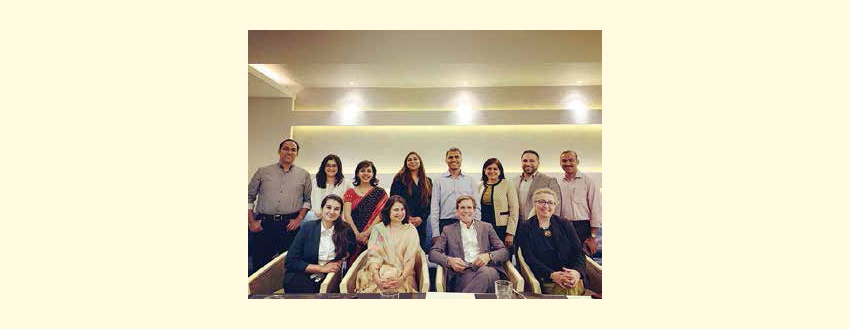India has over 330 million youth who need to be motivated and brought to the mainstream of success and “opportunity” youth, who are out of either work or under employed and in many cases poorly motivated. Here’s the way to go
February 2020 has seen a new development that can have far-reaching ramifications on the future of youth in the country and indeed the world. Aspen Institute USA’s Global Opportunity Youth Initiative (GOYI), which has been a major supporter of three youth development initiatives in Bogota, Colombia; Mombasa, Kenya and Pune, India has decided to rename GOYI as the Global Opportunity Youth Network (GOYN) and adopt the tagline The Future Is Young.
This re-naming signifies the maturing of an initiative that is now taking firm roots in the country and the world. Jamie Mcauliffe, Senior Fellow, Forum for Community Solutions, Aspen Institute, believes that “Network” more accurately describes what all GOYN partners are building together: a constellation of global communities connected by a shared commitment to advance systems change strategies with and for opportunity youth. “Network” also captures the vision for a more established and long-term commitment to work with and for global opportunity youth who need to be prepared to grab the opportunities of the future, reflects the strength of a multiple country network and aspiration to continue to expand to new communities and work with a broader group of opportunity youth leaders and supporters.
Why does this have special significance for India and specifically Pune? Pune City Connect (PCC) has the privilege of being chosen for support through financial sustenance and thought leadership by Aspen, Youth Build International, Global Development Incubator, Accenture and Prudential to further the cause of every young career aspirant from the five hundred plus slum communities of the Pune Municipal Corporation. PCC has been an exemplar in developing agency and aspiration in the youth, counselling them for career and entrepreneurship opportunities, and giving them the requisite skills through a network of skills partners to start their sustainable livelihood journey.
The simplest way to explain the value that a global network adds to this successful local initiative is to talk about Aasiya, a girl from the slums who participated in the transformation process at one of the six skills Light-houses and then went to Maryland to participate in a youth conference hosted by GOYN. Aasiya had her first flight experience, her first interaction with international folk and indeed her very first interactions with people who came from totally different languages and cultures. Today she is highly motivated, with a rich perspective that makes her one of the best Ambas-sadors for both PCC and Aspen and is helping many more youth in Pune to go through similar life-changing experiences.
India has over 330 million youth who need to be motivated and brought to the mainstream of success and “opportunity” youth, who are out of either work or under-employed and in many cases poorly motivated. What PCC with the support of PMC and now the GOYN is attempting to do is to get tens of thousands of Pune youth to be part of this network and eventually transfer this capability to a national audience. And the success of this initiative which is already seeing record sustainable placement rates for skills in India is the ability to bring the Government, Corporations, skilling agencies and volunteer communities together to enable the transformation. The unusual circumstance that spurred the creation and success of the Skills Lighthouses programs is what gives us co-founders of the concept the confidence that the model is transportable across the country and later the world.
India has over 330 million youth who need to be to motivated
Pune City Connect got its momentum in 2015 when a new Municipal Commissioner in the city suggested a friction free model of Public Private Partnership of our Corporate created social entity with the local Government. The Corporation would provide all CAPEX including physical spaces, buses and equipment for digital literacy and; skills while the entire responsibility for raising money and delivering the programs would be taken up by PCC. Mobilizing candidates from the slum communities would be a joint responsibility.
With the model taking off in his tenure, it became firmly instilled in the social fabric of the city. We are grateful that successive Commissioners, Additional Commissioners and indeed the entire Corporation have advocated and supported not just continuity but also acceleration of the Skills Light-houses and digital literacy centres and have extended the “agency” building model-to-model municipal schools. The consistent and strong support of PMC to this PPP is heartening and stands out as an example of long-term commitment to projects, by the Government.
So why is the newly christened GOYN important and what does the tagline “The Future is Young” mean? The tagline in English has a dual meaning, pointing to the idea that young people are our future and the notion that we must act now to create a more positive life and future for young people; that is, our actions today matter. In India this is critical because of a burning platform, livelihood generation, that was always been an issue but is now being further aggravated by the slow economy which refuses to get back on a growth path. A case in point is Uttar Pradesh where the official numbers of unemployed youth have climbed 50% to over 35 lakh youth in just the last two years. If the power of collaborative networks and models like PCC and the Lighthouse can be taken national, the results can truly be path-breaking!
